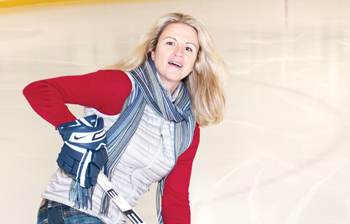By Georgette Gouveia
Sue Merz at Chelsea Piers Connecticut. Photograph by Anthony Carboni.
Watching the Olympics, you imagine that the most memorable moment for an athlete must be the one where she stands atop the podium, alone or with her teammates, or hears the national anthem played, knowing it’s not only for her country but for her.
But for Sue Merz – the gold and silver medal-winning American ice hockey defenseman – the moment she will never forget occurred in the tunnel right as the American athletes were lining up for the Parade of Nations in Nagano, Japan in 1998.
“At the end of the day it was the culmination of the pain and challenges and tragedies I had been through,” says the Milford resident, who honed her athletic skills, if not her stick work, at Greenwich High School. “And I realized how lucky I was. It all came down to luck, skill and timing. I will never forget it.”
Merz is talking to WAG at Chelsea Piers Connecticut in Stamford, where she’s just finished a photo shoot on the ice. Each time she races toward the camera with her stick, chasing an imaginary puck. And each time she stops on a dime, cutting a trim, attractive blond figure, sheer joy written all over her face.
“I was sort of fascinated by going fast and I could go faster on ice than on the ground,” she says. “If I grew up in Colorado, no doubt I would’ve been a downhill racer.”
But Merz grew up in the Glenville section of Greenwich. Not much opportunity for downhill racing there, and as it turned out, not much opportunity for girls’ ice hockey either. Merz played with the boys until puberty made it inequitable. But still she persisted. She skated with the Hartford-based Connecticut Polar Bears, the first all-girl ice hockey program in the state. And she played field hockey and lacrosse at Greenwich High School where Coach Pat Mediate remembers her as a superb citizen-athlete.
“As good as she was on the field that’s as good as she was off it,” Mediate says.
So much so that when it came time to announce the inaugural inductees into the Greenwich High School Sports Hall of Fame last October, Merz was among a distinguished trio that also included NFL legend Steve Young and New York Yankees outfielder and umpire John “Zeke” Bella.
At the dinner, Merz (Class of 1990) charmed the audience of 350 at the Hyatt Regency Greenwich with her self-deprecating humor and candor. The teen years were difficult for her. Athletics got her through some tough times.
Over coffee at Chelsea Piers with her wife, Margaret Mullen-Merz, Sue Merz elaborates.
“My mother died when I was 9,” she says. “My mother figure died when I was in 10th grade. I didn’t have that emotional outlet. My outlet was sports.”
It was also her ticket to the University of New Hampshire, which she attended on a hockey scholarship. After college, it was time to make the decision every graduate faces – get a job or pursue your dream. Merz was already on the national team. With her father’s support, she decided to go for it.
The Merzes are Swiss-American and with her dual citizenship, Sue Merz was able to join SC Lyss (the Skating Club of Lyss) in Switzerland. Her two years there weren’t all hockey. She worked in a kitchen – which led to another passion, cooking – and in a metal factory. Then it was off to Toronto, Canada, in 1996, to train with the very women she would one day play against.
While she had played on several national and world championship teams, Merz was in for a rude awakening. Just before “worlds” in the spring of 1997, she was cut from the team, along with her best friend, Jeanine Sobek.
Merz held a brief “pity party.” Then she got into the best shape of her life and took herself off with her friend to train at Boston University. That August, Merz tried out for the Olympic team and made the cut of 25. She remembers the date, Aug. 30, in part because it was the day Princess Diana was fatally injured in Paris.
Still the team had to be pared down to 20. Merz found out she made the team before Christmas. Her friend Sobek was let go.
That’s why as she stood in that tunnel in Nagano, Merz realized that she, like Tennyson’s “Ulysses,” was a product of all that she had met.
Nagano represented the first time women’s hockey was being contested in the Olympics. The American team was ready.
“I had never been on a team of such selfless individuals where each person had one goal,” she says. “It was awesome, and I’m still close friends with many of the people who were on the team.”
Nevertheless, it was going to be tough to beat the Canadians, who had proved a little bit better, winning seven of 13 encounters. In the final of the round-robin pools, the Canadians were up 4-1. It’s another date Merz won’t forget – Feb. 14, Valentine’s Day and wife Margaret’s birthday, “though I didn’t know Margaret yet.”
“Our coach called us over and said, ‘Let’s just do it.’”
The U.S. team answered with six unassisted goals and a 7-4 victory.
“It was nuts,” Merz says, and it set up a rematch in the gold-medal game. The night before, she says, “I was a wreck.” Merz talked to a sports psychologist who helped calm her nerves. The next day, the U.S. went out and beat Canada 3-1 for the first-ever gold medal awarded in women’s Olympic hockey.
The following Olympics, the team was even better, she says. “But there wasn’t as much of a gel there and it wasn’t a great experience overall.” Team USA fell to Team Canada in the gold-medal round.
You win a bronze medal, Merz says of an Olympic truism, but you lose a silver – meaning that winning a silver medal in a team sport is more about losing the gold.
“It was very painful losing to Canada.”
The loss was less about talent and more about a lack of chemistry, says Merz, who knows a thing or two about chemistry on and off the ice. She has found it with Mullen-Merz, an IBM marketing leader. Indeed, to see the way Mullen-Merz looks at her as she speaks or the way Merz asks her, “What’s a better word for…” is to see two people in love.
The couple wed Sept. 8, 2012 in Milford on a yacht that remained moored thanks to a tornado in Brooklyn. But despite Mother Nature’s bluster, they were bolstered by the support of family and friends.
Today Merz is a senior territory manager for I-Flow, a division of Kimberly Clark that makes nonnarcotic, postoperative pain management devices. Merz knows a lot about pain, having had two cervical disc fusions.
Regardless, she plans on getting back on the ice for fun.
“I know it will be painful,” she says, “but I’ll do it, because I love it.”





